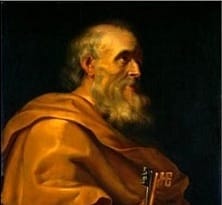Today’s feast celebrates how Jesus Christ built his church upon Saint Peter, the first pope. Jesus Christ is the foundation of the Catholic church, but it was through Saint Peter’s love for him and recognition of who Jesus really was, that Jesus founded his church. It is a beautiful thing that the Catholic church was founded on love and faith in Jesus Christ.
Jesus asked his disciples who the people thought he was? Then he asked the disciples who they thought he was. Saint Peter answered Jesus without hesitation, “You are the Christ, the Son of the living God”. Would that our own faith be that strong! Jesus recognized Peter’s deep faith and love for him when he said:
“Blessed are you, Simon son of Jonah. For flesh and blood has not revealed this to you, but my heavenly Father. And so I say to you, you are Peter, and upon this rock I will build my Church, and the gates of the netherworld shall not prevail against it. I will give you the keys to the Kingdom of heaven. Whatever you bind on earth shall be bound in heaven; and whatever you loose on earth shall be loosed in heaven.”
It’s pretty awesome the way Jesus told Saint Peter that the gates of the netherworld shall not prevail against his church – because it hasn’t for over 2,000 years. The church has been persecuted, because it was responsible for many things in history that was wrong. The Catholic Church has gone through many scandals, including the modern day scandals of the sexual abuse of minors by a few members of the clergy. However, the Catholic church herself is holy, even if some of her members commit serious sins. The devil may have infiltrated our church but he did not succeed in destroying it.
Another thing that is really awesome about these words in the gospel:
“Whatever you bind on earth shall be bound in heaven; and whatever you loose on earth shall be loosed in heaven.”
These words are the basis of the priest’s ability to forgive sins through the sacrament of confession. People who belong to other Christian denominations do not believe in the sacrament of confession, or feel the need to go to the priest to be absolved from your sins. However, this verse in sacred scripture clearly states that our priests have been given this authority. The reason this is true even today is because of the succession of the popes and the laying on of hands.
Saint Peter was made the first leader (pope) of the Catholic church, because Jesus himself gave Saint Peter this power, position and authority, especially for the binding and loosening of sins, marriages and leadership of his church. Saint Peter laid hands on his successors giving them the same authority, who laid hands on their successors and it has continued in an unbroken line from Saint Peter to the present day Pope Francis. This is called the succession of the popes. The popes laid hands on our bishops, who in turn lay hands on every priest that is ordained as well. This authority and power came directly through Jesus Christ himself.
Back to the sacrament of confession though. No matter what sin a person commits (other than the sin of blasphemy) it can be forgiven in confession. Sometimes human beings can not forgive, or hold a grudge. And sometimes people feel like they have to live with their sins for the rest of their lives. They feel like what they did was so terrible it could never be forgiven. Even if this is true with human beings, it is never true with Jesus Christ. It is such a healing thing to hear the priest absolve you of your sins, and be given a fresh start in life again.
In the first reading for mass today, Saint Peter has a few words of advise for those he has put in charge of his people. These words are very beautiful, tender and full of love for God’s people:
“Tend the flock of God in your midst … do not lord it over those assigned to you, but be examples to the flock.”
Let us pray for our priests and bishops today. They truly need our prayers and support during this difficult time in the history of our church.
Daily Mass Readings:
1 Pt 5: 1-4 / Ps 23: 1-3a, 4, 5, 6 / Mt 16: 13-19

